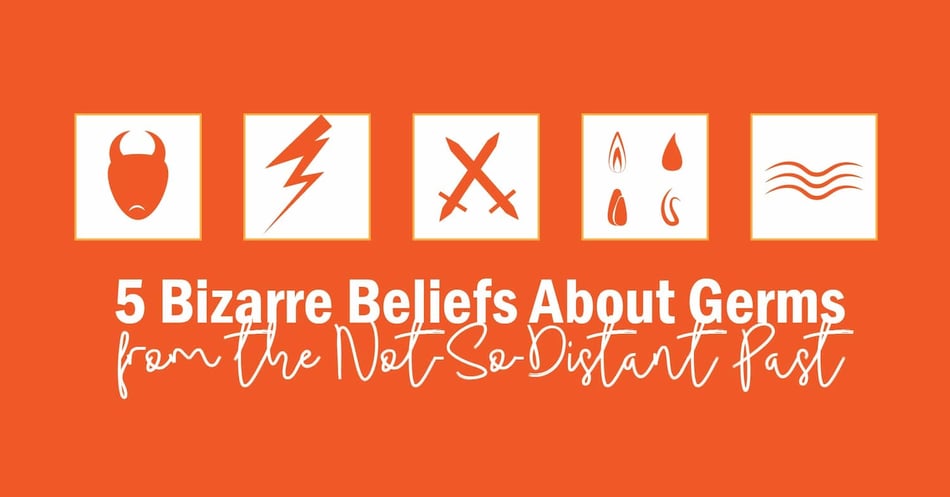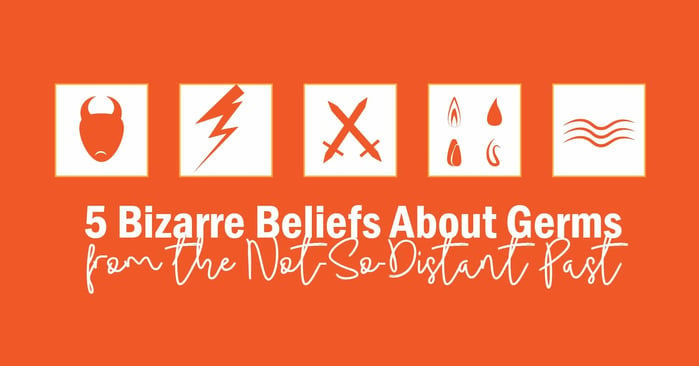5 Bizarre Beliefs About Germs from the Not-So-Distant Past

 We live in a time of tremendous advancements in science and medicine. We can save premature babies, reattach severed limbs (how about heads?), and research looks promising to wipe out some pretty terrifying diseases. And yet even recently, humanity still believed some pretty crazy things about where diseases come from... and each of them share haunting similarities to some beliefs we encounter today.
We live in a time of tremendous advancements in science and medicine. We can save premature babies, reattach severed limbs (how about heads?), and research looks promising to wipe out some pretty terrifying diseases. And yet even recently, humanity still believed some pretty crazy things about where diseases come from... and each of them share haunting similarities to some beliefs we encounter today.
The era of witchcraft, bloodletting, and bad spirits seems so far removed from today's medical practices. But not too long ago, we lacked some fundamental information about what made us sick. Here are some of the most bizarre beliefs about infection that formed the basis of medical care not too long ago.
-
Bad Spirits
Before scientists could identify natural causes for illness and disease, societies determined that supernatural forces brought sickness. Spiritual beliefs were the first ways people began to try to make sense of the world around them, including why people became sick, felt pain and discomfort, or died. Primitive and early medical treatments involved religious or spiritual leaders using prayers, charms, and potions (some so poisonous they actually killed the patient) to rid the individual of what ailed them. The goal was to drive away the bad spirit from the body, a belief that influenced the way we speak about sickness, even today: "Struck" by an illness, "fighting" a disease, "attack" of the flu, sickness "expelled" from our bodies, etc.
-
Sin
Religion also played a significant role in the justification of sickness. More specifically, people believed that angering the gods, committing a sin, or other transgressions were the root of misfortune, including becoming sick. When that sickness was seen to spread to family members or others in the community, it was believed that the sin was spreading, leading to the stigmatization of the sick and even expulsion from society. The best example of this deep-seated belief is the treatment of individuals with leprosy who were barred from society and often forced to live in "lepers colonies" - one even remains to this day, in the United States! Even in very recent history, diseases such as AIDS, alcohol or opioid addiction have been blamed on the patient's poor character or morals, so this belief can still be seen today.
-
Enemies
Supernatural sources of illness were not alone; well into the Middle Ages, illnesses were blamed on foreigners, members of different religions, and real (or perceived) enemies. In medieval Europe, individuals of the Jewish faith were blamed for spreading plague, leading to horrific massacres. When sailors picked up venereal diseases from various ports, the blame was placed on that nation and its people. When influenza spread coincided with an influx of immigrants, that group was blamed and stigmatized. Even today, one of the issues anti-immigration groups raise is the fear of disease, despite all scientific evidence to the contrary.
-
Unbalanced Humors
The early Greeks made enormous leaps in scientific thinking, including the idea that all matter was made up of the same things, just in different combinations. The precursor to the Periodic Table of Elements was the idea of the four Earth elements of air, fire, earth, and water. Alongside these four elements were four basic qualities of matter: Hot, cold, moist, and dry. The behavior of the human body was believed to be controlled by a combination of these elements and qualities, leading to the belief of the four humors. If these four humors - yellow bile, black bile, blood, and phlegm - were unbalanced, the individual would be sick or suffer from an unpleasant temperament. Fever, cough, and other symptoms - along with having a short temper, being depressed, or excessively childish behavior - were all attributed to unbalanced humors. Treatments developed as a way to restore balance, including bloodletting. This belief is perhaps the one that has the least impact on today's world, in some ways because it has been expanded and built upon by concepts such as chemical elements, body fluids, and intelligence types.
-
Bad Air
As scientific discovery and medical practice advanced, researchers began to look for patterns in disease. However, a prevailing belief from the ancient Greeks proved especially difficult to discard: Disease is spread through toxic air, called miasma. Even with our knowledge of germs and transmission, it's easy to see why this idea was so compelling. Disease did seem to spread throughout a community much like a wind or a mist. It took painstaking work by John Snow, a physician in the mid-1800s, to demonstrate that disease could be spread through contaminated water, and further work by Robert Koch in the late 1800s, to demonstrate that the connection was a physical germ spread through contact. (But just ask any infection preventionist if everyone on their team acts accordingly!)
Thankfully, we live at a time when scientific knowledge has led to great medical breakthroughs. We should not forget, however, how difficult it has been over time to let go of familiar but incorrect explanations of the world around us. We need to remember this so that when the time comes to let go of our own old beliefs and accept new discoveries, we are willing and able to move forward. For example, those of us in the world of infection control and prevention still struggle to get colleagues to wash their hands, maintain hygienic surfaces with the correct cleaners, and follow proper sterile protocols during procedures. Even though we are no longer in the Middle Ages, or working in a 1850s hospital ward, we face some of the same struggles as John Snow, Ignaz Semmelweis, and other pioneers. Let's remember (and learn from) our medical past so that we can can make a better medical future.
Editor's Note: This post was originally published in January 2018 and has been updated for freshness, accuracy and comprehensiveness.
![EOScu Logo - Dark - Outlined [07182023]-01](https://blog.eoscu.com/hubfs/Eoscu_June2024/Images/EOScu%20Logo%20-%20Dark%20-%20Outlined%20%5B07182023%5D-01.svg)





